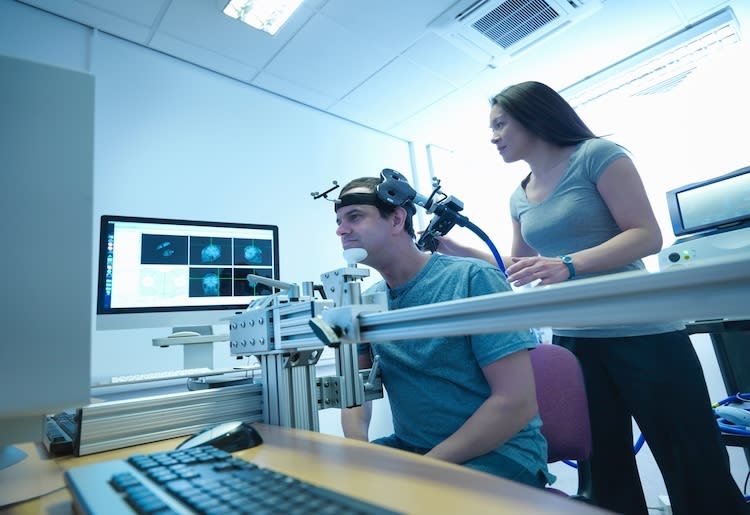As a psychotherapist, I've worked with many individuals struggling with major depression, which affects about 21 million adults in the United States. Major depressive disorder (MDD) can impair professional, social, and emotional functioning and cause feelings of hopelessness, disinterest in once-enjoyed activities, and changes in sleep and appetite.
Online therapy treatments can help improve symptoms. But for more severe cases, non-drug therapies like transcranial magnetic stimulation (TMS) could be beneficial. Here are 10 TMS facts to help you understand how it interacts with MDD.
» Looking for mental health resources? Take a look at these key online aids for depression.
1. A Non-Invasive Outpatient Treatment
TMS doesn't involve needles or sedation. Instead, it generates a magnetic field to various parts of the scalp, which stimulates areas of the brain and affects mood and behavior. With no downtime required, you can keep mentally healthy and return to your normal routine after each session.
These factors make TMS a more feasible alternative to electroconvulsive therapy (ECT), which also delivers electric currents to the brain but does so directly and at a higher intensity that can lead to memory loss, confusion, and fatigue.
2. Has Minimal Side Effects
The most common side effects associated with TMS are:
- Mild discomfort
- Brief headaches
- Jaw tingling during or shortly after treatment
But less than 1% of patients report extreme adverse side effects. Research also shows there are no long-term side effects of TMS.

3. Requires a Time Commitment
The standard course of TMS involves 36 sessions, occurring five days per week for four to six weeks. There is also a taper-off period of six sessions across three weeks. Each session lasts about 20 minutes.
TMS is a time commitment, but with up to 83% of those undergoing treatment being responsive, it may be worth it. Patients can boost their mental health by getting back the happiness and motivation that enables them to enjoy their careers, family, and social lives.
4. Influences Brain Cell Activity
According to a research journal, TMS influences how your brain cells connect and communicate. This impacts how different parts of the brain work together. As a result, it influences how such areas of the brain (and the chemicals they secrete, called neurotransmitters) can be regulated for improved mood states and motivation.
» Learn how to manage common depression triggers.
5. Promotes Growth in Key Brain Regions
When targeting specific regions of the brain, TMS stimulates cells to grow. A Front Neural Circuits journal article notes that key brain regions are implicated in depression, like the hippocampus—a brain region involved in memory and emotion regulation.
Changes in your hippocampus's cells can help explain why your mood may feel a bit brighter after several TMS sessions. Alleviating depressive symptoms can also help improve the effects on physical health with boosted motivation for activities like exercise.
6. Increases Blood Flow Throughout the Brain
TMS increases blood flow to different areas of your brain. When that blood flow repeatedly hits regions involved in emotion and mood regulation, you may experience improved feelings of hopefulness and motivation.
TMS treatment targeting the prefrontal cortex (which manages impulse control and emotional responses) can help with rumination control. This means your "functional connectivity" can be bettered, helping with the negative, passive thinking traps linked to depression.

7. Alters Activity Patterns in Certain Brain Networks
When you're depressed, you may have excessive activity in your "default mode network"—a series of brain structures that become active simultaneously when you're not focusing on a task or when you're daydreaming.
Studies have found that low-frequency TMS can help regulate connectivity between structures in the default mode network. This highlights TMS's role in improving depression symptoms, which can include helping you sleep better.
8. Safe for Pregnant and Postpartum Women
A study reveals TMS is safe and effective for pregnant women. As an FDA- approved treatment, another study states that postpartum moms shouldn't experience any breastfeeding disruptions.
So, TMS can be a helpful way for women to improve their well-being, whether they're expectant or new moms struggling with severe depression. This treatment can also offer reassurance for those who worry about medications interfering with their baby's growth and development.
9. TMS Might Not Be For Everyone
If you have metal in your head or neck (like plates or coils), you may not be able to undergo TMS since it can overheat or displace these objects. You should also inform your TMS provider in advance if any of the following apply to you:
- You wear a pacemaker
- Metal implants are in any other area of your body
- You have a history of seizures
10. Complements Other Treatments
You can still get the most out of online therapy and suitable medications in conjunction with TMS treatment. This may help achieve an even greater sustained effect in relieving depression symptoms than either method can alone.
If you do undergo TMS, make sure all your providers are in communication with one another, especially if you decide to adjust any non-TMS treatments.
» Here are 10 types of therapy you should know about.

Can TMS Cure My Depression?
Based on a PubMed study, the TMS remission rates reach up to 62%. So, TMS can be a safe and powerful option for MDD patients, particularly those with treatment-resistant depression.
TMS can also complement traditional counseling like ReGain, aimed at couples, and Pride Counseling, designed for individuals identifying as LGBTQIA+. But be sure to consult medical professionals so you can find the best solution for you and your mental health needs.
» Discover how you can help a friend with depression.
